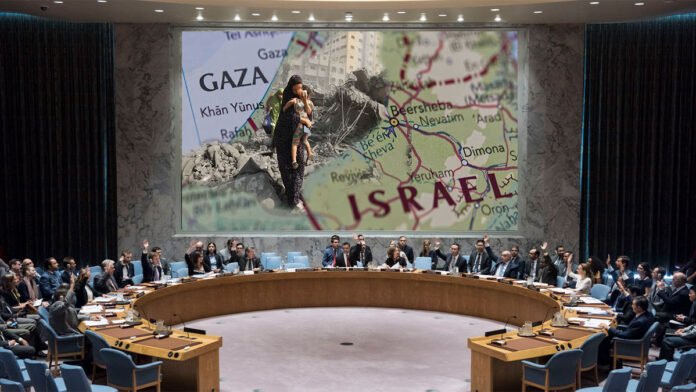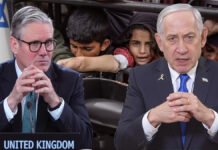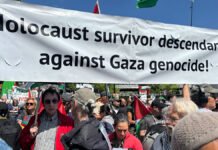The United Arab Emirates initially aimed to bring its draft resolution to a vote on Sunday, but to sidestep a potential US veto, the vote has been repeatedly postponed over the past few days. Despite ongoing negotiations and several modifications to the draft to accommodate the US, Washington remains opposed to the establishment of a UN mechanism for monitoring aid into Gaza.
Security Council members are now anticipating a third US veto to impede council action on the Israel-Hamas conflict. While the United States and the United Kingdom have not publicly disclosed their voting intentions, it is anticipated that the draft will receive overwhelming support from other council members.
Expect speeches later today to reflect a mix of frustration, regret, and anger among council members. The delay primarily arises from challenges in reaching a consensus between the US and the UAE on the resolution’s wording. The prolonged diplomatic negotiations in New York focus on precise language, particularly regarding the cessation of hostilities and UN monitoring of aid.
The draft resolution, proposed by the UAE, seeks to demand that Israel and Hamas allow land, sea, and air deliveries of aid throughout Gaza. Additionally, it calls on UN Secretary-General Antonio Guterres to establish a mechanism for monitoring humanitarian assistance.
In addressing potential vetoes, the language of the UAE’s proposal has been diluted. Both the US and Israel oppose a ceasefire, arguing it would primarily benefit Hamas. The US, exercising its powers as one of the Security Council’s five permanent members, has previously vetoed similar resolutions. Instead, Washington supports temporary pauses in fighting to protect civilians and facilitate the release of hostages held by the militant group.
The draft resolution initially called for an “urgent and sustainable cessation of hostilities” on Monday morning but was later revised on Tuesday to “call for the urgent suspension of hostilities to allow safe and unhindered humanitarian access, and for urgent steps towards a sustainable cessation of hostilities.”
The resolution calls for:
- The parties of the conflict in Gaza to comply with their obligations under international law, regarding the protection of civilians
- Urgent and extended humanitarian pauses and corridors throughout the Gaza Strip for a sufficient number of days to enable full, rapid, safe, and unhindered humanitarian access
- The immediate and unconditional release of all hostages, as well as ensuring immediate humanitarian access
- Reiterates the vision of the two-state solution, with the Gaza Strip as part of a Palestinian State
- Also calls for all parties to “refrain from depriving the civilian population in the Gaza Strip of basic services and humanitarian assistance indispensable to their survival”
While a permanent ceasefire in the Gaza Strip remains distant. The key to this lies in a potential shift in Hamas’s stance, which has consistently insisted on releasing more Israeli hostages only in exchange for a permanent ceasefire.
The seriousness of the situation is underscored by the fact that Ismail Haniyeh, senior political leader of Hamas, has travelled to Cairo with a “high-level” delegation for talks with Egypt’s intelligence chief, Abbas Kamel.
According to reports from mainstream Israeli media, Israel has presented a plan to mediators outlining the potential release of approximately 30 to 40 hostages. This proposal prioritises the release of remaining women, elderly individuals, and those in urgent need of medical care.
The suggested exchange involves Palestinians held in Israeli prisons, individuals convicted of more severe offences than those released in the previous deal. It is speculated that such an agreement could result in a truce lasting for a week or two.
The hope is that aid will get through to the beleaguered people of Gaza in this short respite of hostilities.
Of course, the one thing that has changed apart from the 20,000 civilians killed in 10 weeks is the fact that Israeli soldiers have shot and killed Israeli hostages freed by Hamas. Even though they were naked from the waist down and waving white flags.
The Israel Defense Forces (IDF) admitted that the Israeli military had killed three young men in the Shejaiya neighbourhood in the Gaza Strip after an Israeli soldier mistook them for terrorists. The victims, who were among the 240 hostages taken captive by Hamas on October 7, were later identified as Yotam Haim, Samer El-Talalka and Alon Shamriz.
The three men were shirtless and one of them was waving a makeshift white flag, according to the reports. The shots killed two of the men, while a third was wounded but managed to flee to a nearby building. He was later killed by gunfire when he came out of the building, after crying for help in Hebrew, the probe reportedly found.
Meanwhile, Netanyahu says Israel will keep fighting until Hamas defeated
Israeli Prime Minister Benjamin Netanyahu has just published a statement seemingly ruling out the possibility of an immediate ceasefire in Gaza “before the elimination of Hamas”.
In a post on social media, he says anyone who thinks Israel will stop the war before achieving its goals is “not connected to reality”.
“We won’t stop fighting until we’ve achieved all the objectives we’ve set ourselves: the elimination of Hamas, the release of our hostages and the end of the threat from Gaza,” he reiterates in the statement.
It seems any hope of even a temporary ceasefire will die before it’s given a chance to breathe…
Gaza is truly the land of the dead and everyone has become a victim…
Support Independent Journalism Today
Our unwavering dedication is to provide you with unbiased news, diverse perspectives, and insightful opinions. We're on a mission to ensure that those in positions of power are held accountable for their actions, but we can't do it alone. Labour Heartlands is primarily funded by me, Paul Knaggs, and by the generous contributions of readers like you. Your donations keep us going and help us uphold the principles of independent journalism. Join us in our quest for truth, transparency, and accountability – donate today and be a part of our mission!
Like everyone else, we're facing challenges, and we need your help to stay online and continue providing crucial journalism. Every contribution, no matter how small, goes a long way in helping us thrive. By becoming one of our donors, you become a vital part of our mission to uncover the truth and uphold the values of democracy.
While we maintain our independence from political affiliations, we stand united against corruption, injustice, and the erosion of free speech, truth, and democracy. We believe in the power of accurate information in a democracy, and we consider facts non-negotiable.
Your support, no matter the amount, can make a significant impact. Together, we can make a difference and continue our journey toward a more informed and just society.
Thank you for supporting Labour Heartlands












